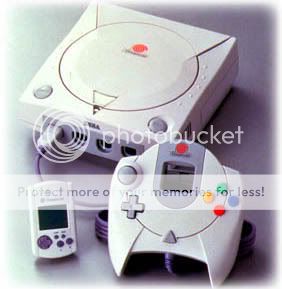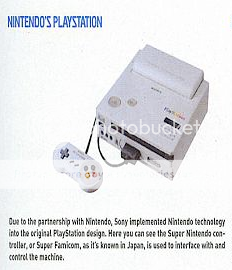Hello all, I'm not sure whenever I'll be able to begin this one, but it'll be my first foray into truly trying to write an ATL. So until I ever get back to this, consider this just a teaser, alright? The meat of this will be doing this as we switch around through time from the points of view for developers and gamers alike as this alternate hardware 'Cold War' continues on.

Tell me, do you know what that is? If you haven't guessed, it's the Sega Dreamcast. As you probably know, Sega dropped out of the console race in North America in 2001 (starting in 1999 for Europe and the USA; 1998 for Japan), but still lingered on in Japan until 2006. There are several factors that played into its failure: the launch of the Sony PlayStation 2, Sega's financial exhaustions from the failed Sega CD and Sega 32X along with the bad launch and premature death of the Sega Saturn, lack of strong third party support, and no strong marketing plan in North America. It was a great console, in this humble poster's opinion, and she will surely be missed by him.
And yet...did it have to be this way? Could we have kept Microsoft and Sony out of the console race? Could Sega have triumphed if they had done some things differently? What of Nintendo, as well?
An important factor in the Dreamcast's decline was heavy financial debt inflicted upon it by two ugly peripherals on the waning power of the Sega Genesis: the 32X and CD. Now mind, the CD actually had some potential in it, and while it usually had what is called 'shovelware,' it did do things first like introduce full motion video into the mainstream, which would help, in OTL, the PlayStation, wherein Sony had several teams working with Sega on the Sega CD console. Sony once offered to partner with Sega to make a console, which kicked Sony over and to try and get into Nintendo's good graces. The man who the Genesis owes a lot of her might against in North America against the Super Nintendo juggernaut was the president of Sega of America, Tom Kalinske (running from 1990 to 1996), creator of the popular "Sega Scream" campaign. He lived, breathed, ate, and slept the Genesis and helped keep her going for as long as she did. He eventually left because of his disagreements with Sega of Japan over the release of the 32X...but what if that had never happened? What if the 32X never saw the light of day and they had focused instead on the upcoming 32-bit system, the Sega Saturn? This butterfly ensures no rushed console, perhaps stronger third party support, and will take away some of the damage done to Sega's finances.
Nintendo had been, at this time, been a bit worried over whether or not the Sega CD would succeed it. If we take the 32X out of the equation, it's possible Nintendo could be more worried about the CD and...go straight into Sony's arms. Did you know that the 'PlayStation' originally started out as a Super Nintendo add-on? It's true, but in OTL, Nintendo eventually rejected Sony in favor of Phillips, and supported their god awful CD-i system (yup, with the crappy Legend of Zelda 'trilogy' and Mario game made for it you're probably familiar with if you know what a YouTube Poop is, or are at least familiar with video game memes). But let us suppose that Nintendo, in the perceiving of a stronger support for the Sega CD, took Sony up on that offer? Historically, prior to the Nintendo 64, all Nintendo consoles in Japan were actually floppy-disk based systems, which earned the title 'Famicom' (Family Computer). The idea behind the 'Nintendo PlayStation' was to bring that convenience over to America and Europe, with a bit more processing power behind it. So what might one of these bad boys have looked like?

Now, would it have been a success? This is a bit debatable, however, I think that at least it may have done better than the Sega CD (which we will presume is falling out in favor now of the Sega Saturn), as Nintendo was rolling in third party support those days, and the fact that Sony had brought CD-based console experience to the deal. So what might have happened? If it had been a success, perhaps Sony would have struck a similar deal with Nintendo: to make consoles together. And Nintendo, echoing our world with the unveiling of the Wii and bringing a whole paradigm to gaming, accepts this offer. One of the reasons, a major one, in OTL that Sony had decided to make the PlayStation was because of the rejection of both Nintendo and Sega at her proposals. With one of these at least met, and Sony seeing a steady amount of revenue now, and in the future, this safely butterflies the existence of the PlayStation away.
And with this, ironically, the eventuality of Bill Gates realizing he might need to 'save the future of multimedia entertainment' is also probably butterflied away (he realized this around 1999 and the year right now is probably 1994 or 1995; with no PlayStation, he probably has no reason to worry). What's also good about this is that Microsoft will eventually be in talks with Sega to help put out the Dreamcast (it did have the sticker 'runs on Windows CE' on it, after all). Ever wonder why, after Sega of America was closing down, Microsoft released the Xbox with such a similar controller? With a successful Dreamcast we're positing, the Xbox will never see fruition. I don't think Sega would be strife to Microsoft either, and it may be a partnership similar to what we're suggesting Sony and Nintendo have right now.
-Edited: realized that Apple probably is a poor choice for a third party company; research will resume and determine who's going to stay in-

Tell me, do you know what that is? If you haven't guessed, it's the Sega Dreamcast. As you probably know, Sega dropped out of the console race in North America in 2001 (starting in 1999 for Europe and the USA; 1998 for Japan), but still lingered on in Japan until 2006. There are several factors that played into its failure: the launch of the Sony PlayStation 2, Sega's financial exhaustions from the failed Sega CD and Sega 32X along with the bad launch and premature death of the Sega Saturn, lack of strong third party support, and no strong marketing plan in North America. It was a great console, in this humble poster's opinion, and she will surely be missed by him.
And yet...did it have to be this way? Could we have kept Microsoft and Sony out of the console race? Could Sega have triumphed if they had done some things differently? What of Nintendo, as well?
An important factor in the Dreamcast's decline was heavy financial debt inflicted upon it by two ugly peripherals on the waning power of the Sega Genesis: the 32X and CD. Now mind, the CD actually had some potential in it, and while it usually had what is called 'shovelware,' it did do things first like introduce full motion video into the mainstream, which would help, in OTL, the PlayStation, wherein Sony had several teams working with Sega on the Sega CD console. Sony once offered to partner with Sega to make a console, which kicked Sony over and to try and get into Nintendo's good graces. The man who the Genesis owes a lot of her might against in North America against the Super Nintendo juggernaut was the president of Sega of America, Tom Kalinske (running from 1990 to 1996), creator of the popular "Sega Scream" campaign. He lived, breathed, ate, and slept the Genesis and helped keep her going for as long as she did. He eventually left because of his disagreements with Sega of Japan over the release of the 32X...but what if that had never happened? What if the 32X never saw the light of day and they had focused instead on the upcoming 32-bit system, the Sega Saturn? This butterfly ensures no rushed console, perhaps stronger third party support, and will take away some of the damage done to Sega's finances.
Nintendo had been, at this time, been a bit worried over whether or not the Sega CD would succeed it. If we take the 32X out of the equation, it's possible Nintendo could be more worried about the CD and...go straight into Sony's arms. Did you know that the 'PlayStation' originally started out as a Super Nintendo add-on? It's true, but in OTL, Nintendo eventually rejected Sony in favor of Phillips, and supported their god awful CD-i system (yup, with the crappy Legend of Zelda 'trilogy' and Mario game made for it you're probably familiar with if you know what a YouTube Poop is, or are at least familiar with video game memes). But let us suppose that Nintendo, in the perceiving of a stronger support for the Sega CD, took Sony up on that offer? Historically, prior to the Nintendo 64, all Nintendo consoles in Japan were actually floppy-disk based systems, which earned the title 'Famicom' (Family Computer). The idea behind the 'Nintendo PlayStation' was to bring that convenience over to America and Europe, with a bit more processing power behind it. So what might one of these bad boys have looked like?

Now, would it have been a success? This is a bit debatable, however, I think that at least it may have done better than the Sega CD (which we will presume is falling out in favor now of the Sega Saturn), as Nintendo was rolling in third party support those days, and the fact that Sony had brought CD-based console experience to the deal. So what might have happened? If it had been a success, perhaps Sony would have struck a similar deal with Nintendo: to make consoles together. And Nintendo, echoing our world with the unveiling of the Wii and bringing a whole paradigm to gaming, accepts this offer. One of the reasons, a major one, in OTL that Sony had decided to make the PlayStation was because of the rejection of both Nintendo and Sega at her proposals. With one of these at least met, and Sony seeing a steady amount of revenue now, and in the future, this safely butterflies the existence of the PlayStation away.
And with this, ironically, the eventuality of Bill Gates realizing he might need to 'save the future of multimedia entertainment' is also probably butterflied away (he realized this around 1999 and the year right now is probably 1994 or 1995; with no PlayStation, he probably has no reason to worry). What's also good about this is that Microsoft will eventually be in talks with Sega to help put out the Dreamcast (it did have the sticker 'runs on Windows CE' on it, after all). Ever wonder why, after Sega of America was closing down, Microsoft released the Xbox with such a similar controller? With a successful Dreamcast we're positing, the Xbox will never see fruition. I don't think Sega would be strife to Microsoft either, and it may be a partnership similar to what we're suggesting Sony and Nintendo have right now.
-Edited: realized that Apple probably is a poor choice for a third party company; research will resume and determine who's going to stay in-
Last edited: